Civil disobedience is the active, professed refusal of a citizen to obey certain laws, demands, orders or commands of a government. By some definitions, civil disobedience has to be nonviolent to be called "civil". Hence, civil disobedience is sometimes equated with peaceful protests or nonviolent resistance.
The WOMBLES were a loosely aligned anarchist and anti-capitalist group based in London. They gained prominence in the early 2000s for wearing white overalls with padding and helmets at May Day protests, mimicking the Italian group Tute Bianche.

A black bloc is a tactic used by protesters who wear black clothing, ski masks, scarves, sunglasses, motorcycle helmets with padding or other face-concealing and face-protecting items. The clothing is used to conceal wearers' identities and hinder criminal prosecution by making it difficult to distinguish between participants. It is also used to protect their faces and eyes from pepper spray, which is used by police during protests or civil unrest. The tactic also allows the group to appear as one large unified mass. Black bloc participants are often associated with anarchism, anarcho-communism, communism, libertarian socialism and the anti-globalization movement.
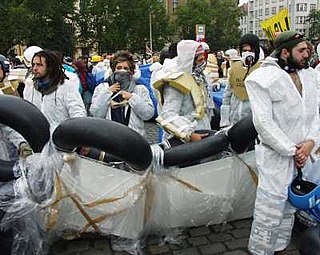
Tute Bianche was a militant Italian social movement, active from 1994 to 2001. Activists covered their bodies with padding so as to resist the blows of police, to push through police lines, and to march together in large blocks for mutual protection during demonstrations.

A protest is a public expression of objection, disapproval or dissent towards an idea or action, typically a political one. Protests can be thought of as acts of cooperation in which numerous people cooperate by attending, and share the potential costs and risks of doing so. Protests can take many different forms, from individual statements to mass political demonstrations. Protesters may organize a protest as a way of publicly making their opinions heard in an attempt to influence public opinion or government policy, or they may undertake direct action in an attempt to enact desired changes themselves. Where protests are part of a systematic and peaceful nonviolent campaign to achieve a particular objective, and involve the use of pressure as well as persuasion, they go beyond mere protest and may be better described as a type of protest called civil resistance or nonviolent resistance.
Electronic civil disobedience can refer to any type of civil disobedience in which the participants use information technology to carry out their actions. Electronic civil disobedience often involves computers and the Internet and may also be known as hacktivism. The term "electronic civil disobedience" was coined in the critical writings of Critical Art Ensemble (CAE), a collective of tactical media artists and practitioners, in their seminal 1996 text, Electronic Civil Disobedience: And Other Unpopular Ideas. Electronic civil disobedience seeks to continue the practices of nonviolent-yet-disruptive protest originally pioneered by American poet Henry David Thoreau, who in 1848 published Civil Disobedience.

The 3rd Summit of the Americas was a summit held in Quebec City, Quebec, Canada, on April 20–22, 2001.

2004 Republican National Convention protest activity includes the broad range of marches, rallies, performances, demonstrations, exhibits, and acts of civil disobedience in New York City to protest the 2004 Republican National Convention and the nomination of President George W. Bush for the 2004 U.S. presidential election.
¡Ya basta! is a phrase in Spanish roughly approximate to "Enough is enough!" in British English or "Enough already!" in US English. It has been adopted by several Latin American insurgent groups as an expression of affront towards issues that sparked the original dissent. Its adoption by the EZLN in Mexico as the movement's motto is exemplary of its popularity and ability to rally diverse ideologies under a common goal.
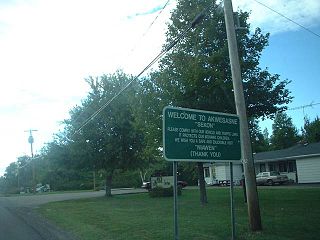
The Mohawk Nation at Akwesasne is a Mohawk Nation (Kanienʼkehá:ka) territory that straddles the intersection of international borders and provincial boundaries on both banks of the St. Lawrence River. Although divided by an international border, the residents consider themselves to be one community. They maintain separate police forces due to jurisdictional issues and national laws.
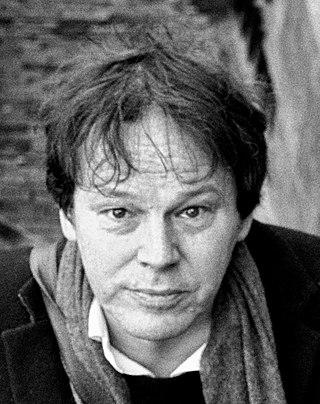
David Rolfe Graeber was an American anthropologist and anarchist activist. His influential work in economic anthropology, particularly his books Debt: The First 5,000 Years (2011), Bullshit Jobs (2018), and The Dawn of Everything (2021), and his leading role in the Occupy movement, earned him recognition as one of the foremost anthropologists and left-wing thinkers of his time.
Direct Action Network (DAN) was a North American confederation of anti-corporate, anti-authoritarian and anarchist affinity groups, collectives, and organizations. It grew out of the Seattle chapter which had been formed to coordinate the nonviolent civil disobedience portion of the anti-WTO mobilization in Seattle in 1999.
The Clamshell Alliance is an anti-nuclear organization founded in 1976 to oppose the Seabrook Station nuclear power plant in the U.S. state of New Hampshire. The alliance has been dormant for many years.
Direct Action to Stop the War (DASW) was an organization that coordinated nonviolent direct action-based opposition activities to the 2003 invasion of Iraq in the San Francisco Bay Area. The organization was founded in October 2002 following an overnight sit-in and morning blockade at the San Francisco Federal Building following the U.S. Congress's authorization of the use of force against Iraq. Operating primarily through the use of affinity groups and a spokescouncil, it coordinated a mass effort by 5,000 to 20,000 people to disrupt business in the financial district of downtown San Francisco following the beginning of the war in March 2003. The organization persisted through 2004, coordinating a variety of local protests against corporations with ties to the war effort and sending hundreds of activists to protests in Cancun, Miami and New York City.

Nonviolent resistance, or nonviolent action, sometimes called civil resistance, is the practice of achieving goals such as social change through symbolic protests, civil disobedience, economic or political noncooperation, satyagraha, constructive program, or other methods, while refraining from violence and the threat of violence. This type of action highlights the desires of an individual or group that feels that something needs to change to improve the current condition of the resisting person or group.
Contemporary anarchism within the history of anarchism is the period of the anarchist movement continuing from the end of World War II and into the present. Since the last third of the 20th century, anarchists have been involved in anti-globalisation, peace, squatter and student protest movements. Anarchists have participated in armed revolutions such as in those that created the Makhnovshchina and Revolutionary Catalonia, and anarchist political organizations such as the International Workers' Association and the Industrial Workers of the World have existed since the 20th century. Within contemporary anarchism, the anti-capitalism of classical anarchism has remained prominent.
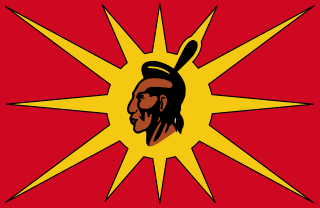
The Rotisken’rakéhte, also known as the Mohawk Warrior Society and the Kahnawake Warrior Society, is a Mohawk group that seeks to assert Mohawk authority over their traditional lands, including the use of tactics such as roadblocks, evictions, and occupations.

The anti-globalization movement, or counter-globalization movement, is a social movement critical of economic globalization. The movement is also commonly referred to as the global justice movement, alter-globalization movement, anti-globalist movement, anti-corporate globalization movement, or movement against neoliberal globalization. There are many definitions of anti-globalization.
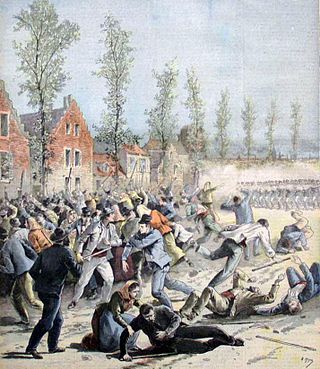
Direct action is a term for economic and political behavior in which participants use agency—for example economic or physical power—to achieve their goals. The aim of direct action is to either obstruct a certain practice or to solve perceived problems.

Diversity of tactics is a phenomenon wherein a social movement makes periodic use of force for disruptive or defensive purposes, stepping beyond the limits of nonviolent resistance, but also stopping short of total militarization. It also refers to the theory which asserts this to be the most effective strategy of civil disobedience for social change. Diversity of tactics may promote nonviolent tactics, or armed resistance, or a range of methods in between, depending on the level of repression the political movement is facing. It sometimes claims to advocate for "forms of resistance that maximize respect for life".












